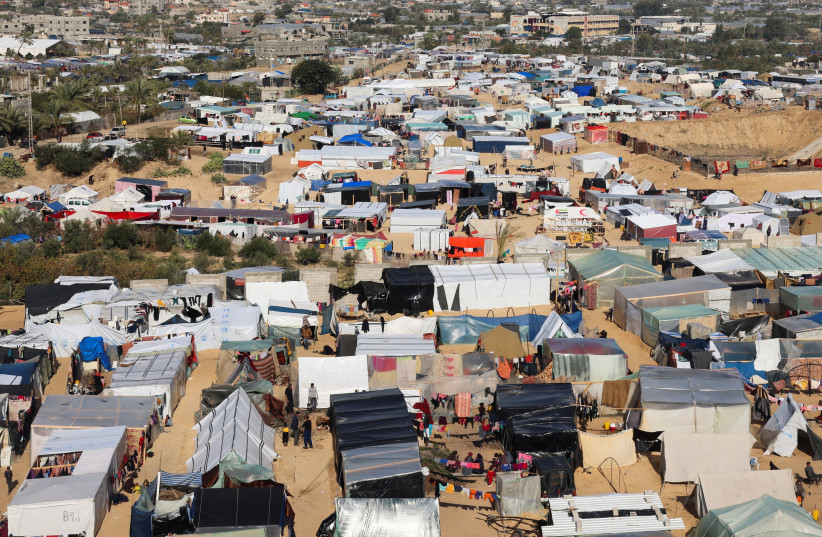Hamas appears to sense that its rule over Gaza is in jeopardy and is returning to its roots as a thuggish, mafia-like organization, cracking down on Gazans who speak out against it and massacring people seeking humanitarian aid.
It’s important to understand the context. Hamas began as a relatively small organization. Although its ideological roots are in the Muslim Brotherhood and political Islam, its actual early members such as Yahya Sinwar, were killers who emerged in a mafia-like world in places like Khan Yunis.
In those days, in the 1980s, when Israel-controlled cities in Gaza, family rivalries used to result in feuds and killings. Later, in the 1990s, there was still a great deal of violence in Gaza between clans. Hamas replaced these groups.
Downing dissent in the Gaza Strip
After 2007, when Hamas brutally banished the Palestinian Authority following its 2006 election, it was quick to put down any dissent. Hamas also benefited from a partnership with international organizations and provided “security” for most internationals and the UN in Gaza.
This meant that Hamas police were seen as the force for “law and order” by international groups. After the October 7 massacre and Israel’s retaliation, Hamas has lost control of some areas of Gaza. However, their plainclothes thugs have returned to many of these areas whenever Israel withdraws, and seek to keep people from speaking out against the terrorist group.

It appears now that Hamas is concerned it could be losing a grip on power. This comes as Israel has sought to enable humanitarian aid to enter Gaza via routes that avoid the Hamas “protection” that takes place in Rafah in southern Gaza. Hamas uses its control over aid to control Gaza.
It appears now that Hamas is concerned it could actually be losing its grip on power as Israel has sought to channel humanitarian aid into enter Gaza via routes that avoid Hamas “protection,” as in Rafah in southern Gaza. Hamas uses its control over aid to control Gaza.
Escalating violence in Gaza
On Friday, gunmen in Gaza shot at civilians who were trying to obtain aid at the Kuwaiti roundabout which is in the Zeitun area, south of Gaza City. This area is near the Netzerim corridor that is controlled by the IDF. The gunmen operate in the area that is outside of IDF control.
The IDF said that “about an hour before the entry of the aid convoy [on March 14], Palestinian gunmen were seen opening fire in the midst of a crowd of Gazan civilians. We emphasize that IDF forces did not open fire at the aid convoy in Kuwait Square. The IDF is continuing to examine the incident while making strenuous efforts to bring humanitarian aid to the residents of the Gaza Strip, while Hamas terrorists are harming the residents of Gaza and spreading lies with the purpose of blaming the State of Israel.”
It’s not clear if the gunmen who massacred the people near the Kuwait roundabout were Hamas members, but it stands to reason that they were. Hamas is the group that has access to weapons and it is in Hamas’s interest to massacre people.
The Hamas-run health authorities put out claims that Israel was responsible for the “massacre” as it did after the stampede in late February.
Israel is now facilitating more aid into Gaza by sea via a new artificial pier. This, and another aid corridor for trucks, is supposed to bypass Hamas control. Hamas wants to stop this aid being delivered and also opposes airdrops. Hamas has likely encouraged its contacts in international organizations to issue statements against the airdrops.
A HAMAS CRACKDOWN is also targeting Gazan clans. Reports of an Israeli initiative to work with Gaza clans clearly concerns the terrorist group.
Hamas recently murdered several Gaza clan members to send a mafia-like message against these family-based groups. One victim was a leader of the Doghmush clan, powerful in eastern Gaza, in areas such as Tal al-Hawa and Sabra, according to a report on Ynet. Saleh Doghmush is a leader of the clan, but it was not immediately clear if he was the victim. Hamas has increased its rhetoric against the clans over the last week.
The IDF said last week that “in accordance with government directives, six humanitarian aid trucks containing aid from the World Food Programme (WFP) entered the northern Gaza Strip via the “96th” gate on the security fence last night (Tuesday). This was done as part of a pilot in order to prevent the Hamas terrorist organization from taking over the aid.”
In addition, on Wednesday, the IDF said that ”following IDF and ISA (Shin Bet) intelligence, an IDF aircraft precisely targeted and eliminated a terrorist in Hamas’s Operations Unit in the area of Rafah, Muhammad Abu Hasna. Hasna was a combat support operative in Hamas’s military wing. He was also involved in taking control of humanitarian aid and distributing it to Hamas terrorists.”
These two statements illustrate how Israel is also following developments in Gaza regarding the aid distribution issue. To remove Hamas from controlling Gaza will require removing their control over aid.
Now there are discussions about Israel’s operations in Rafah, which Hamas uses to control aid coming into Gaza. Israel has approved plans for an operation in Rafah, and hostage talks are continuing.
Its recent spate of murders clearly indicates the lengths to which Hamas will go to keep its monopoly on aid distribution, concentrating more on suppressing Gazans than on fighting Israel.
